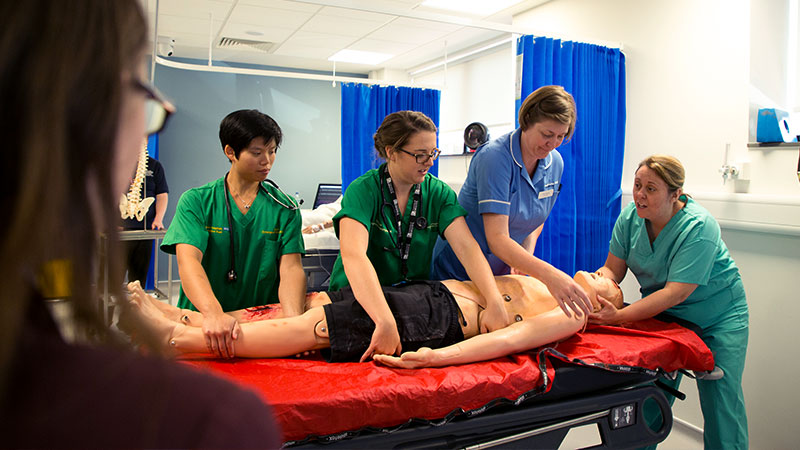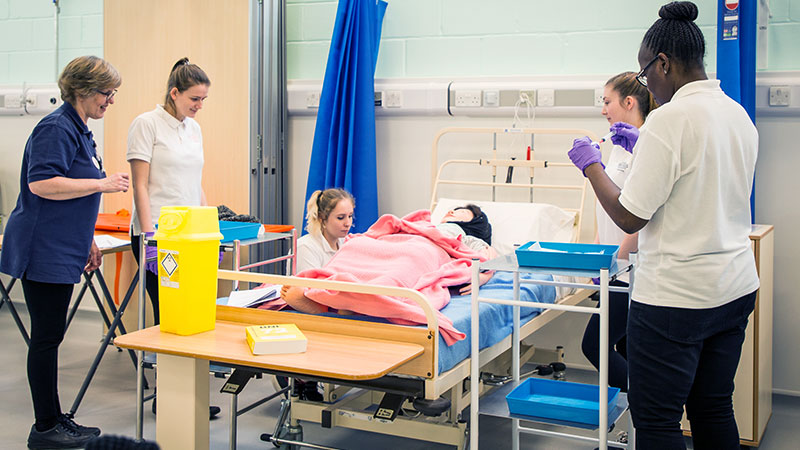Emergency Care
PGCert
Key facts
Course code
PGC-EMC
Start dates
September 2023
Application deadline
1 August (for a September start)
Location
Course length
Part time: 9 months (Sept) / 12 months (Jan)
This course is not available to students classed as International for fees purposes.
Overview
Our Postgraduate Certificate in Emergency Care enables UK registered healthcare professionals to achieve professional development and gain experience in this specialist area.
Our course covers the management of patients in an emergency department with differing care needs. You will have the opportunity to develop your:
- knowledge
- skills and understanding of assessment
- planning, delivery and evaluation of care.
You will undertake learning assessments based around practice and the workplace. There is an emphasis on practice focused learning. You will be able to develop as a practitioner, transferring course skills to direct service provision. We place importance on your experience within the educational process, from both a personal and professional perspective.
Relevant national and international research and evidence based literature informs course content. This helps you expand the breadth of your studies and develop a depth of critical analysis and evaluation of practice.

How to apply
Entry requirements
- UK or overseas degree from a recognised institution or equivalent professional or other qualification.
- Students must hold professional registration with the relevant Nursing and Allied Health Professional Body in the UK.
- Students will normally have a minimum of 12 months post-registration experience in an emergency care environment.
- Be working in a relevant clinical environment in which they can achieve the clinical skills required.
- Have access to an appropriate practice supervisor within that area
- Support of their line manager.
Terms and Conditions of Enrolment
When you accept our offer, you agree to the Terms and Conditions of Enrolment. You should therefore read those conditions before accepting the offer.
Application process
Apply through our Moodle Portal.
Applications are dealt with on a first come, first served basis, so please act early to avoid disappointment.
If you only wish to take one module as a stand alone module (rather than as part of the PGCert), then you can apply to be a postgraduate associate student.
Tuition fees
Questions about fees?
Contact Student Finance on:
Tuition fees
Fees quoted are for the first year only. If you are studying a course that lasts longer than one year your fees will increase each year.
How and when to pay
Tuition fee instalments for the semester are due by the Monday of week 1 of each semester. Students are not liable for full fees for that semester if they leave before week 4. If the leaving date is after week 4, full fees for the semester are payable.
- For information on payment methods please see our Make a Payment page.
- For information about refunds please visit our Refund policy page
Financial support and scholarships
Additional costs
Please be aware that some courses will involve some additional costs that are not covered by your fees. Specific additional costs for this course are detailed below.
Learning and assessment
You will study three compulsory modules on this PG certificate
- Sem 1: NURS7037 Adult Emergency Care (20 credits)
- Sem 2: NURS7036 Childrens Emergency Care - 20 credits (or NURS7030 Advanced History Taking and Assessment, 20 credits - as alternative)
- Sem 3: NURS7038 Developing Emergency Care (20 credits)
Assessment is 100% Coursework.
On successful completion of this course allows you will be awarded the Postgraduate Certificate in Emergency Care worth 60 CATS credits at Level 7.

Study modules
Learning and teaching
The teaching, learning and assessment strategy of the programme reflects its student centred, patient-centred and practice-focused approach.
The modules have an appropriate division between structured learning activities and private study. Opportunities for sharing existing and developing skills, knowledge and experience, are maximised. In order to make the most of the range of experience, skills and knowledge within the group, a variety of teaching and learning strategies will be employed. This is to encourage development of critical self-awareness and personal literacy within the context of both academic and research literacy.
Assessment
Assessment methods used on this course
We will assess you with a variety of methods. Assessments give you an opportunity to demonstrate knowledge as well as the critical and reflective analysis required for professional practice.
NURS7037 Adult Emergency Care: Simulated scenario assessment
NURS7038 Governance in Emergency Care: Poster presentation and abstract
NURS7036 Children’s Emergency Care: Case study essay and Learning contract
NURS7030 Advanced History Taking and Assessment: Practical Scenario Assessment and 'Evaluation of clinical skills practice' assessment
Programme changes:
On rare occasions we may need to make changes to our course programmes after they have been
published on the website. For more information, please visit our
changes to programmes page.
